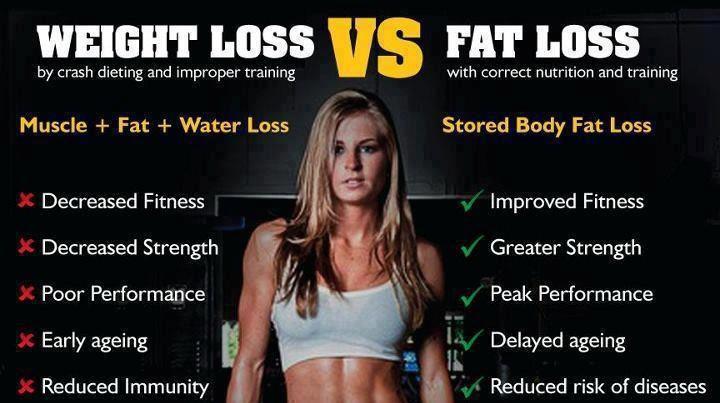FAT LOSS vs. WEIGHT LOSS
There is a big difference between losing weight and losing fat. An individual’s goal should never be to lose weight, but instead should always be to lose fat. However in today’s fast moving world people are looking for weight loss and consider weighing scale as an indicator for health or progress.
Weight Loss vs. Fat Loss:
What’s the difference? Let’s start by defining weight loss & fat loss so you know what I mean here.
Weight Loss: You want to lower your body-weight, the sum weight of your bones, muscles, organs, body fat.
Fat Loss: You want to lower your body fat, the amount of fat your body carries. Healthy goals are 10% body fat for men and 15% for women.
Today when you want to lose weight you lose not just weight on the scale but you lose a little bit of everything which includes –fat, muscle, fluids, organ size. However you want the majority of your weight loss to come from fat, not the other stuff.
There are three explanations for weight loss, says strength and performance specialist Joel Seedman, Ph.D., owner of Advanced Human Performance in Atlanta: Losing fat, losing muscle, and losing water. With a perfect diet and workout regimen, you’ll just be shedding fat. But because there are so many moving parts when it comes to dieting and working out, chances may also be losing weight you’d rather keep.
Muscle Loss
Muscle requires constant work to maintain—we all know this. But if your attention is on fixing your diet or upping your cardio in order to burn fat, that focus is probably coming at the expense of strength training.
Muscle tissue also regulates your insulin sensitivity—the biological process that determines how well your body absorbs nutrients. If you lose muscle tissue from dieting improperly, the nutrients you eat are less likely to be partitioned to your muscle cells and more likely to be turned into fat cells.
Water Loss
One of the fastest ways to lose weight in the short-term is to cut carbohydrates—that’s because carbohydrates retain some three times as much water than any other type of macronutrientWhen you cut back on carbs, your body isn’t retaining as much water, plain and simple.
But losing water weight is like buffing your car—it makes the exterior look sleeker, but the beautification is short lived and no interior improvements have actually been made.
You can drop a few pounds quickly by losing water weight. Besides that, any type of significant dehydration is unhealthy and won’t last long.
List of Weight loss products: –
Fat Loss
An individual’s aim is for maximum lipolysis—the biological process of breaking down fat, lipids and triglycerides in either the food you eat or that are already stored in your body.
Let’s focus on Fitness
Remember when we said, losing weight doesn’t always mean you are fit. A fit body has lower levels of fat percentage, 10% to 15% for men and 15% to 20% for women. Your fat percentage is the true measurement of how fit and in which shape your body is.
You see, weight loss and fat loss is not necessarily the same thing. Weight loss is very easy to accomplish, what is difficult is fat loss.
Losing body fat requires time and effort. It comes down to regularly consuming fewer calories than you burn with the required and right amount of nutrients.
You’ll gain muscle while losing fat when you get into strength training. But on the weight scale it will look like you’re not making progress: your body-weight doesn’t change. Track your body fat using a fat caliper and you’ll see your body fat is going down.
Clothes, mirrors & pictures don’t lie. Neither do fat calipers. But the weight scale can become your worst enemy by misleading you and killing your motivation. Focus on consistently making progress, whether it’s with your body fat percentage, workout time, or quantity of reps of an exercise.
When losing weight, the way to lose just fat is by adding strength training into your fitness program. Don’t try to lose weight simply by performing cardio. The pounds you lose through cardio will come right back if you stop the cardio, without muscle mass to keep the weight off. Don’t worry about bulking up or gaining too much muscle. For the majority of the population, it’s simply not a concern. When you add muscle, you improve the body fat composition ratio, which is the main goal.
However, this DOES NOT mean that you shouldn’t lose weight. If you’re overweight, some weight loss is required to restructure your body, but at the same time, also focus on fat loss. The ideal way to achieve this is engaging in a combination of weight training and cardio exercises.
Conclusion:
Focus on fat loss first. Once you’ve got your body fat down, check if you like what you see. Then decide if you still need to lose weight. If you drop 10 pounds in a week, the vast majority of that will be water weight and a little bit of muscle loss as well.
